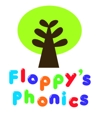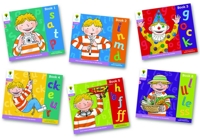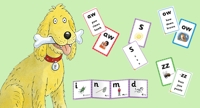English
English RationaleEnglish is the language of learning in every curriculum subject. English allows children to learn independently and is therefore empowering. At Croftlands Infant & Nursery School the teaching of English is enjoyable, motivating and challenging.
We teach basic skills and provide a rich, meaningful and engaging learning environment. We strive to inspire a love and appreciation of English and ensure that every child becomes a competent reader and writer.
Intent
At Croftlands Infant & Nursery School it is our intent to provide children with a board, balanced and challenging English curriculum. Children will embark on an exciting journey that supports and develops their speaking, listening, reading and writing skills.
The children will become confident speakers who initiate and engage in discussions with others. We will equip children with the necessary skills required to become capable and confident readers, thus providing a lifelong love of reading and literature. By immersing the children in a rich variety of texts we will inspire their imagination. Children will develop an extensive vocabulary that will inspire them to write clearly and accurately for a range of contexts, purposes and audiences. By developing children’s reading and writing we aim to prepare them for lifelong learning.
Implementation
These aims are embedded across our English lessons and the wider curriculum. We have a rigorous and well organised English curriculum that provides many purposeful opportunities for reading, comprehension, writing, speaking and listening and grammar.
Pupils are immersed into a range of fiction and non-fiction texts and through engaging lessons they are equipped with the skills to write for a range of contexts, purposes and audiences.
Phonics
In addition to daily English lessons, children excel in early reading through the teaching of phonics. Phonics and spelling rules are taught systematically throughout Early Years and Key Stage One.
At Croftlands Infant & Nursery School we use “Floppy’s Phonics.” This complete systematic synthetic programme provides structure and support for children in Early Years and Key Stage 1 to become fluent and confident readers. Children learn to read sounds and blend them into words. They apply this phonic knowledge to read and comprehend Storybooks that are carefully matched to the sounds they know. Children learn to read these books with a storyteller’s voice. Children also learn how to form letters using mnemonics and to spell correctly. They learn to compose their own writing - drawing upon ideas from the story they’ve just read. Children's progress is tracked each half term.
Guided and Shared Reading
Reading is taught through shared and guided reading, children enjoy a wealth of age related texts that motivate and inspire them to read. Through discrete guided reading sessions children are given access to age-related texts that are carefully matched to their reading ability. Children work in small groups and are encouraged to use a range of skills in these lessons, summarising texts, making predictions, investigating new and ambitious vocabulary, and to be inquisitive asking and answering questions.
Individual Reading
All children are provided with a school reading book that is matched to their reading ability, children are encouraged to read frequently at home. We use Oxford Reading Tree books to match children’s phonic level and comprehension skills. Children also have access to a personalised library of reading books in our “reading areas” in our classrooms. Where children are reading below the expected level for their age reading is also taught through targeted interventions led by Teaching Support Assistants such as daily individual reading and Early Literacy Support.
Story Time
Children are read aloud to in class on a daily basis. Story time is inspiring and is hugely exciting for everyone. We aim to develop children’s English skills and inspire them to develop a love of reading and a knowledge of a variety of authors. The fiction and non-fiction texts are carefully chosen in advance for a variety of reasons:
- Books that elicit a strong response, curiosity, laughter, anger, excitement and empathy
- Books to extend children's vocabulary
- Books that have illustrations which are engaging and reflect children from all backgrounds and cultures
- Books that help children connect with who they are
- Books that help children to understand the lives of people whose experiences and perspectives may be different from their own
Croftlands Infant & Nursery School and Class Library
Throughout the school children are encouraged to choose books independently. Each classroom has its own designated and inviting reading area which includes a wide range of fiction and non-fiction books, some of which are linked to current class topics.
Reading for Pleasure
Our aim is to develop a love of reading and children that read for enjoyment. Reading for pleasure is promoted in a variety of ways, in school and with our families. Throughout the school week children are encouraged to this time gives children the opportunity to enjoy a book of their choice and promotes health and well-being.
We encourage reading fairs with visiting publishers and we are actively fundraising to fund future author visits and to purchase books for school.
Impact
At Croftlands Infant & Nursery School we use both formative and summative assessments to inform medium term and weekly planning. Assessments are also used at half termly Pupil Progress meetings. Spotlight children are identified and intervention planned and implemented. Assessment data is submitted termly and achievement and progress of groups of learners is analysed. Lesson observations, book scrutinies, learning walks and pupil/parent/staff voice are all used to monitor the teaching and learning of English across the school.
Published data (2018/2019) shows that the number of children working at or above the expected level at Croftlands Infant & Nursery School is above National and Local averages in Reading and significantly above the expected level in Writing.
Children achieving greater depth for Reading are above the National average.
Our most recent Year 2 Phonic data shows 86% of children passed the phonic screening check.

English is developed through guided and shared reading and writing, daily phonic activities and tasks such as retelling stories, book making and games, drama and role play activities, in addition to more formal grammar, punctuation and spelling activities, all of which support the child’s development as an active speaker and listener.
In the school we aim to provide a breadth of reading experience and foster an enjoyment of books. Reading is taught through a variety of approaches—mainly based on phonics but also including recognition of familiar high frequency words and whole sentence work. At Croftlands Infant School, we use Oxford Reading Tree as our reading scheme.
The reading progress of all children is carefully monitored by the class teacher and additional support is given to any child where necessary. Reading books are sent home on a daily basis and changed twice a week to be shared with parents/carers as part of a child’s homework.
Phonics

Phonics is proven to be the most effective method of teaching children to learn to read as it simplifies the English language down into just 44 sounds. Children therefore 'decode' words by breaking them down into its sounds rather than having to memorise 1,000's of words individually.
At Croftlands Infant School, we teach our children using a rigorous synthetic phonics programme called Floppy’s Phonics. Floppy's Phonics is a beautifully crafted programme that is rigorous, easy-to-use and engages children from the outset, enabling them to learn to read quickly. This wonderful programme teaches the letter/sound correspondences of the English alphabetic code explicitly and comprehensively for reading and spelling. It includes the characters of Floppy the dog, Biff, Chip and Kipper, which engages children fully for the phonics teaching & learning, vocabulary enrichment and language comprehension.
To reinforce the phonics teaching in school, your child may bring home some books and activities to share with you.
This includes:
- Fully decodable phonics book linked to the sounds/phase they are learning in school.

- Floppy Phonics Activity sheet.
- Say the sounds poster.
- Grapheme and picture tiles.

Click here for the EYFS Literacy Curriculum.
Click here for 'Literacy' within Birth to 5 Matters Birth to 5 Matters
Click here for the KS1 English Curriculum.
English Policy

